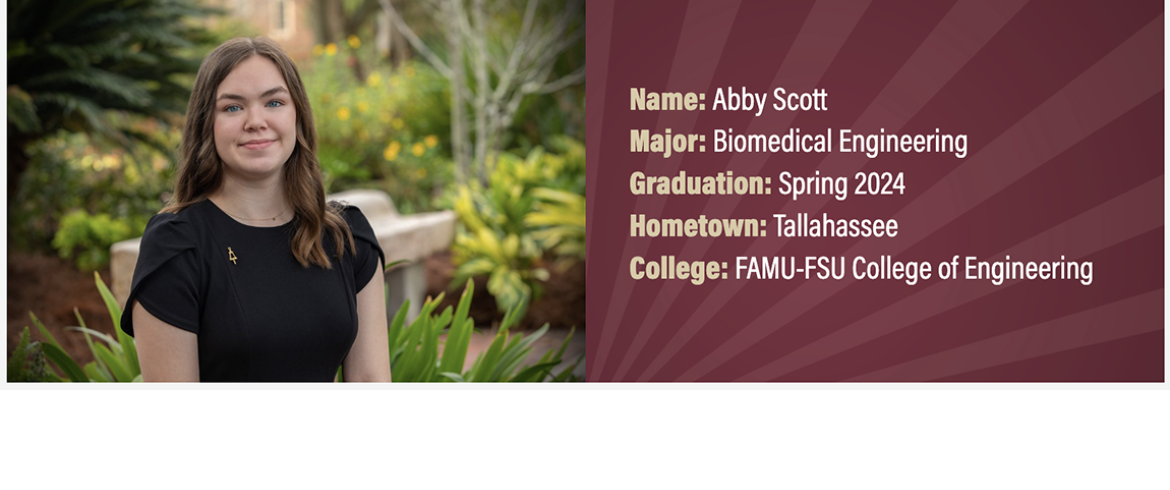
FSU student makes strides in biomedical engineering with stroke treatment research
For most of her life, biomedical engineering student Abby Scott knew she wanted to make an impact in the field of medicine. After seeing her grandmother’s struggle with Alzheimer’s disease, she believed Florida State University was the best place to contribute to the fight against neurodegenerative diseases.
“I wanted to go to a university in Florida that would provide excellent research opportunities along with the tools necessary for pursuing a career in medicine post-graduation,” Scott said. “After taking a tour, I instantly felt at home and knew FSU would be the perfect fit for my undergraduate career.”
Scott is a research assistant in the National High Magnetic Field Laboratory under Samuel Grant, professor and postdoctoral fellow director in the Office of Postdoctoral Affairs. Scott’s honors thesis, which she will defend in April, is on the application of extracellular vesicles to an ischemic stroke model in animals.
The Grant Lab is part of the FAMU-FSU College of Engineering and uses the 21.1T/900 MHz magnet, the strongest magnetic resonance imagery (MRI) scanner worldwide for small animals. Her work at the lab gives Scott an inside look at how new cell-based therapeutics are developed, as well as opportunities to take part in those developments.
“FSU has provided me with a tight-knit learning community where I practice niche skills and develop projects that relate directly to what I hope to do in the engineering industry.”
Outside the laboratory, Scott is passionate about community service and outreach. She logged over 150 community service hours at FSU and helped prepare for FSU’s Homecoming for three years.
Scott also serves as the outreach coordinator of FSU’s chapter of Tau Beta Pi, the oldest engineering honor society in the United States. She helped organize the society’s involvement in Second Harvest’s food distribution, as well as STEM education events at local schools and at the Challenger Learning Center.
Scott credits the FAMU-FSU College of Engineering and National MagLab for the invaluable knowledge and education she gained at Florida State.
 “Alongside my involvement with the MagLab, I’ve been granted one-of-a-kind research positions and opportunities to work with student leaders from Florida A&M University in various organizations,” Scott said. “I am confident I would not be able to get as wonderful of an experience as an engineering student anywhere else.”
“Alongside my involvement with the MagLab, I’ve been granted one-of-a-kind research positions and opportunities to work with student leaders from Florida A&M University in various organizations,” Scott said. “I am confident I would not be able to get as wonderful of an experience as an engineering student anywhere else.”
After graduation, Scott plans to pursue a doctoral degree in biomedical engineering and a career in neurodegenerative disease treatment research.
What stands out about your experience at the FAMU-FSU College of Engineering?
The joint college allows for students from both universities to lead alongside each other on executive boards and in chair positions for engineering-based organizations. This allows our organizations to be present in more areas of Tallahassee and participate in events and traditions for FAMU and FSU.
What do you do as a research assistant in the lab?
As a research assistant in the Grant Lab, my day-to-day tasks typically involve plating, feeding and expanding cells. Specifically, I work with adipose-derived stem cells. The Grant Lab is based out of the National MagLab, so I help image cells as a part of experiments used to show contrast sugars such as mannose in cell membranes. I also work to isolate extracellular vesicles from these cells. These vesicles have properties that can promote healthy tissue regeneration after stroke. I will also run characterization experiments on the extracellular vesicles to provide more details on their contents.
What’s your favorite part about being the outreach coordinator for Tau Beta Pi?
My favorite part has been helping involve our organization within our college and the city of Tallahassee. I’ve always been told that you don’t have to travel across the world to make a difference but to start with needs close by. I love interacting with future generations to hopefully inspire them to pursue engineering. I wish my schools would have done more to encourage interest in science, technology, engineering and mathematics, so I hope to help be a part of seeing that change today.
How has FSU helped you pursue your passions?
FSU has provided me with a tight-knit learning community where I can practice niche skills and develop projects that relate directly to what I hope to do in the engineering industry. Attending FSU has allowed me to gain hands-on experience in the lab of Dr. Grant where I get to learn about cell culture and MRI techniques. FSU has also allowed me to learn from student leaders across our campus and the College of Engineering. There really is an opportunity for everyone to be involved in something they love at FSU. Working alongside my peers and learning from their leadership and experiences during my time at FSU is something I am grateful for.
RELATED LINKS
National High Magnetic Field Laboratory
Grant Lab
Tau Beta Pi
